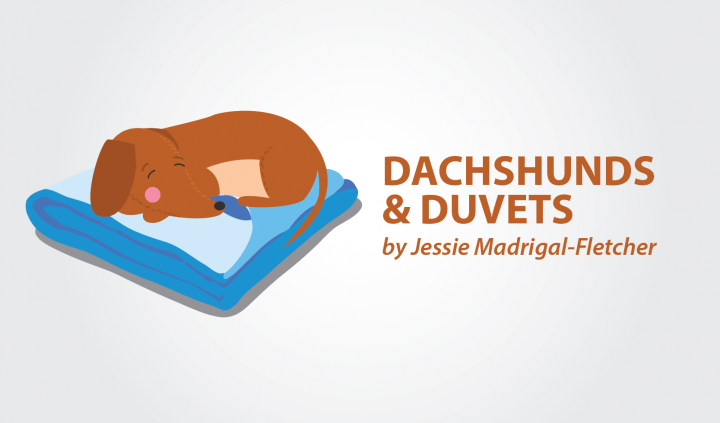One of my favorite mantras is, “Life ain’t easy for an over-packer.” It’s right up there with, “Nothing good happens after 2 a.m.” Whenever I travel, I pack for England, dare I say, the entire world. I pack several combinations of every outfit, including at least three pairs of shoes. I never go without my arsenal of tools to deal with The Frizz, aka my hair. To top it off, because I have endometriosis, I carry several forms of pain relief: medication, my TENS machine, its charger, extra pads in case the TENS gives up the ghost. Last but not least, and always included in my luggage, my beloved hot water bottle.
I am such a fiend for this humble rubber object that I own three. One is in the shape of a sausage dog — I must clarify that, as with everything wiener-themed I own, it was a gift.
My hot water bottle is responsible for the shocked reactions I get every time anyone sees my bare stomach. During bikini season I am repeatedly asked what’s wrong with my stomach. It gets so bad I now only wear swimwear that covers my abdomen.
The latest person to raise the subject was my osteopath. He made me acknowledge my problem on our first appointment. I had been overusing my hot water bottle so much, my skin glistened differently. I knew what water bottle burns looked like and thought that as long as I avoided those, I was fine. Turns out I was wrong.
So why do I use a water bottle?
A hot water bottle not only is emotionally and physically comforting, but it helps with period pain and bad flare-ups. The first time most of us get our period, our mothers, aunts, and sisters will direct us toward the water bottle.
Yet, there’s a strong argument against them.
In the words of my friendly osteopath, I and fellow endometriosis patients are literally cooking ourselves. There is a theory that posits that heat can soften and change the appearance of the fascia. The fascia is interconnective tissue surrounding muscles and internal organs. The belief is that once we stop applying heat, the fascia re-hardens. This means that it could potentially become more rigid and, consequently, more painful. Some even theorize that endometriosis adhesions behave in the same way as the fascia, which could be problematic for any patient.
So, should we use them?
A hot water bottle is a comforting tool. It obviously helps with pain, otherwise you wouldn’t see countless endo patients clutching one. But seeing how it affects the upper layers of our skin, it’s hard to ignore the warnings of what could be happening at a deeper level. Realizing that the damage I’d created was so visible to the naked eye jolted me to reduce my hot water bottle dependency.
Now when I reach for one, I follow the safety precautions carefully:
I never fill it with boiling water. I also keep it half-full; that way, it won’t burn as much. Most importantly, I never place it on my bare skin, especially when it’s super warm.
I am not sure I will quit this comforting habit completely. In fact, paragraphs in this column have been written with one hand while the other clutched my hot water bottle. But I have started to reduce the times I reach for it. Since I’ve lessened my use, my osteopath has already pointed out the positive changes on my skin. If I must have my trusty hot water bottle, I keep it close to me, but not on my abdomen. If pain gets bad, a TENS machine is the better alternative.

Actually, do you know what is a great hot water bottle substitute? A small dog! Mine are pros at applying comforting, warm pressure on my belly. Most importantly, there are countless puppies in animal shelters waiting to become honorary water bottles.
So there you have it. I’m wrapping up this week’s column with my yearly reminder to adopt, not shop. And while I’m at it, I’ll add that a pooch is for life, not just for Christmas.
***
Note: Endometriosis News is strictly a news and information website about the disease. It does not provide medical advice, diagnosis, or treatment. This content is not intended to be a substitute for professional medical advice, diagnosis, or treatment. Always seek the advice of your physician or other qualified health provider with any questions you may have regarding a medical condition. Never disregard professional medical advice or delay in seeking it because of something you have read on this website. The opinions expressed in this column are not those of Endometriosis News or its parent company, BioNews Services, and are intended to spark discussion about issues pertaining to endometriosis.

